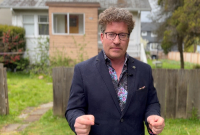Support strong Canadian climate journalism for 2025
Ethan Birch, a 21-year-old student at Brock University, is still not sure who he will vote for in the June 2 election, but he’ll be studying the parties’ platforms with specific questions in mind.
He may also depend on the findings of a poll released Monday for guidance. The survey, commissioned by voter mobilization group Future Majority, found young Ontario voters are concerned about affordable housing, mental health and climate change.
In his fourth year, Birch is studying English and creative writing. He plans to complete a master’s degree and is hoping for a career in the public sector.
He says Future Majority’s findings resonate with him, and he’s angry the party leaders seem to be ignoring these issues.
Birch says he typically votes NDP or Liberal.
Though he plans to cast a ballot, he may be part of a shrinking demographic. Although Elections Ontario does not provide statistics on voter turnout and demographics, Elections Canada says 66 per cent of eligible youth aged 18 to 24 voted in the 2021 federal election, down two percentage points from 2019. Typically, voter turnout in provincial elections is lower than the federal level.
Groups such as Future Majority are trying to reverse the trend in Ontario.
For instance, the group has been holding weekly focus groups with undecided young voters in swing ridings. The Greater Toronto Area holds more than 50 of Ontario’s 124 legislative seats, and pollsters say these ridings are typically up for grabs.
Keeping up with the times
To increase engagement and encourage young voters to head to the polls, Future Majority has launched VoteTube, a platform for party leaders to reach out to young Ontarians.
The leaders answer young voters’ questions on policy and get personal by fielding queries like:
- What was your first job?
- What will you do to ensure the economic security and opportunity of young Canadians?
- What cities have you lived in?
- What will you do to ensure every young Ontarian is able to access affordable housing — now and in the future?
- What has COVID-19 been like for you and your family?
- What will you do to improve access to mental health care for young Ontarians?
- What were you like when you were younger?
- Did you think you would become a politician?
- What is your message to young people voting in this election?
Liberal Party Leader Steven Del Duca answered questions while cooking. NDP Leader Andrea Horwath shared her plan for Ontario through the Autocomplete Challenge (taking after the popular WIRED videos featuring celebrities). Green Party Leader Mike Schreiner answered questions while shooting hoops.
Progressive Conservative Leader Doug Ford opted out, with his office telling Future Majority he did not have time in his schedule.
Camellia Wong, Future Majority’s communications director, says the video platform helped young voters get a sense of the leaders’ personalities and learn about their policies.
Voters’ checklist: Where do the parties stand on certain issues?
As candidates for all parties sprint to the finish, Wong says young voters should be armed with specific questions as they decide who to support at the ballot box.
For example:
- What will you do to ensure every young Ontarian is able to access affordable housing?
- What will you do to ensure the economic security of young Canadians?
- What will you do to improve access to mental health care?
- How will your party support alternative energy sources to reduce demand for fossil fuels?
- If your party forms the next government, how will you foster greater levels of co-operation on environmental issues among Indigenous communities?
These are questions Birch has been asking.
He’s still waiting for answers and hoping that party leaders continue efforts to engage youth to solve the issues that matter most to them.






Comments